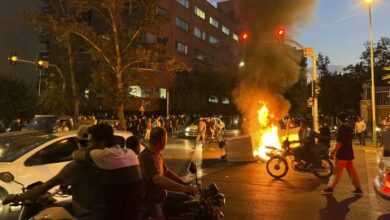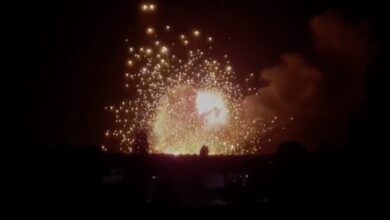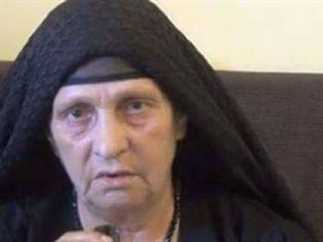As clashes erupted on Sunday night between military forces and a group of mostly Coptic protesters demonstrating against sectarian attacks, questions were raised about the impartiality of Egypt’s state-run media.
Minister of Information Osama Haikal urged the media to deal “wisely” with the clashes in their coverage. Haikal’s statements stirred controversy among media experts and journalists, amid renewed calls to purge the media, which explains why Maspero, the site of the Egyptian television, is also the site of countless protests.
“The media should abide by standards of impartiality in their coverage,” says Naila Hamdy, a professor of journalism and mass communication at the American University in Cairo. “I believe, though, that the message was directed to state media, rather than private TV channels,” she told Al-Masry Al-Youm.
In an interview with Haikal on the state-run Channel One, TV host Rasha Magdy said that “unlike state media that is owned by the people, private channels have their own agendas, working against Egypt’s democratic transition for the sake of a scoop.”
Magdy repeatedly emphasized that Coptic protesters were attacking soldiers. She started her broadcast by apologizing for not being able to host the families of military martyrs of the 1973 war because of the unfortunate events, and went on to say that “the same troops that fought the war and sided with the revolution earlier this year are under attack as we speak.”
Magdy, in what some view as an incitement to violence, ended her broadcast with a call on Egyptian citizens to protect the military.
“State TV committed a number of fatal mistakes,” says Hamdy, citing an interview with a military soldier who called Coptic protesters “dogs” and asked people to defend the soldiers.
“This might not have been intentional,” says Hamdy. “But it is certainly giving the wrong message and has to stop.”
Channel One repeatedly claimed that Coptic protesters were attacking the military with stones, Molotov cocktails and occasionally live ammunition.
This coverage has stirred the anger of some journalists working in state television.
Mahmoud Youssef, who works for state television, announced on his Twitter account that he rejects the way the news was covered. “I work as a host for the Egyptian television and I’m innocent of what the Egyptian television is broadcasting,” he said.
Similarly, Taghreed al-Dossouky, who works in state television, wrote on her account: “I reject the Egyptian state media’s coverage because it incites sectarianism, and I condemn all those who partake in it.”
Dina Rasmy, a long time host with Egyptian television, wrote on her Facebook page: “I’m ashamed I work for this disrespectful television. The Egyptian television has called for a civil war between Muslims and Christians. The Egyptian television has proven it is the slave of whoever is ruling.”
State media suffers from a lack of editorial vision and confuses its role as a social and political mediator with its function as an impartial news outlet, says media expert Yasser Abdel Aziz. “This is why its performance has been so sluggish and weak, driving many to rely on alternative news agencies.”
Another source of criticism is its reliance on cameras from its building overlooking the area in front of Maspero, rather than on filming and conducting interviews on the ground.
“I would assume they have the technical equipment to go on the street by now,” mocks Hamdy.
Despite its strategic location, the state media aired no footage of military armored vehicles chasing and running over protesters in front of the building – footage that was repeatedly aired on private local and foreign channels. What state TV mostly showed were protesters blocking the Corniche and military tanks set on fire.
Nile News was somewhat more balanced than Channel One. It had cameras on the ground and conducted interviews with injured on both sides. “We did the best we could, given the circumstances, as it was very difficult to leave the building last night,” says Hesham Assy, an anchor at Nile News who covered the violence on Sunday. Military and security forces cordoned off the building most of the time in an attempt to prevent protesters from reaching it.
“We gave room to all voices, not knowing what they would say in advance,” he adds, citing a phone interview conducted with a member of the Maspero Youth Union, a Coptic activist group, where he denied that the soldiers who died in the clashes were martyrs, as they had been killing their own people.
But overall, the coverage seems to have led viewers to believe that Coptic protesters caused the violence.
As of this morning, the main message propagated on state media is that conspiracies are underway to arouse conflicts between the armed forces and the people. There have also been repeated airings of archival footage showing Egyptian military troops crossing the Suez Canal during the 1973 war.




